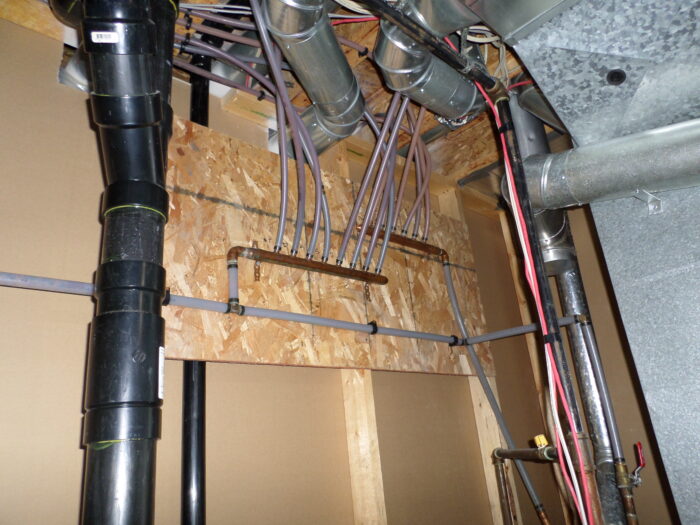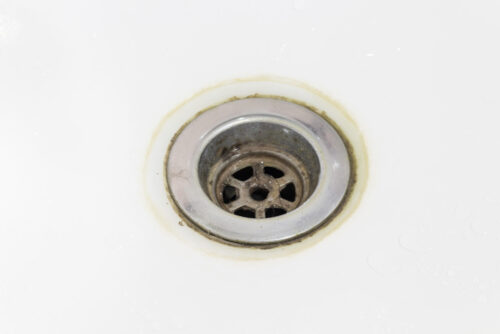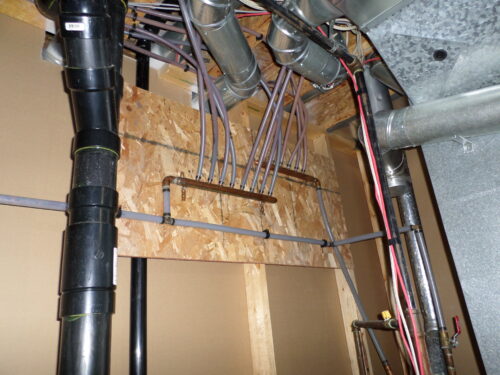Your plumbing system should be just like the old English proverb, “Children should be seen, and not heard.” A good plumbing system should provide water and drainage on demand without much more noise than splashing water.
Unfortunately, some systems are quite noisy. Here are some of the sounds you may hear, some of the causes, and some remedies.
 Hot & Cold Plumbing Manifolds c/w PEX Pipe
Hot & Cold Plumbing Manifolds c/w PEX Pipe
6 Common Water Pipe Noises
Water pipes generally will make 5 different types of noises.
- Hammering. Most often occurs when a tap is turned off quickly.
- Banging. Banging pipes are usually caused by loose or inadequate anchors.
- Squeaking. Or whistling. Will only come from hot water pipes.
- Ticking. Quite often the sound of a faulty water meter.
- Gurgling. Drain problems usually caused by plugged P-traps or air intakes.
1) Water Hammer
Water hammer is the term generally used to describe the more technical ‘hydraulic shock’. The hammering noise you hear occurs when a water tap is turned off and water in the pipe bangs into the valve and pipe walls trying to find somewhere else to go. This usually occurs when at wide open tap is shut off quickly or an appliance like the washing machine or dishwasher quits filling. The sound is caused by metal pipes vibrating and banging against surrounding framing.
As loud and annoying as water hammer is, it can be fixed fairly easily. If you have access to the plumbing pipes, make sure all of the pipe straps or CPVC fasteners are tight. Add a few more if you can. Plumbing pipe fasteners can be as much as 8 to 10 feet apart and the violence inside the pipe can make it buck away from the stud and slap back again.
Two other options to consider are air chambers and mechanical water shock arrestors. Both are installed near the valve (tap) causing the problems.
- Air Chamber. An air chamber is a short section of pipe attached to the water line to provide a place for the water to go when the tap is closed. The air in these pipes acts as a shock absorber and eliminates water hammer. Please note that these need to be filled with air to be effective. To recharge the system, drain the lines occasionally. Turn off the incoming water, open the lowest tap in the house to let water out, open the highest tap in the house to let air in. When the lines are empty, close all taps and turn the water back on.
- Water Shock Arrestors. Water shock arrestors are mechanical, containing a spring and bladder to buffer water shock. Arrestors work without having to drain the system. They will need to be replaced when you start hearing water hammer again. Shock arrestors are more expensive than air chambers, but are easier to install and do not require line draining to continue working.
2) Loose Pipes
Loose plumbing pipes contribute to clunking, banging, vibration, or rattling noises. Loose pipes also make any other noise, like water hammer, worse. Make sure that any pipe you have access to is solidly attached to the framing. Use the appropriate fasteners. (Copper pipes have a chemical reaction to galvanized and aluminum straps.)
While you are tightening your pipes, make sure that you use foam pipe wrap or Mass Loaded Vinyl strips to prevent rubbing on the framing members they are attached to.
3) Pipe Expansion
Almost all pipe expansion problems and noise is eliminated if the entire incoming water system uses PEX piping.
Copper Piping
Copper pipe carrying hot water expand and contract because of the heat. This causes them to rub against, or come in contact with framing members. If you have access to the hot water pipes, you can use foam pipe wrap or Mass Loaded Vinyl to help keep the wood and pipes isolated.
If you do not have access to the hot water pipes, and because this is usually not a terminal plumbing problem, you are probably safe leaving it alone until you are doing a major renovation. If the noise is not too crazy-making.
CPVC Piping
CPVC pipe is used to replace copper. Although it expands and contracts like copper, it usually does not make noise. Unless it is installed incorrectly. If it is run in a tight place or through a hole too small, you will hear clicking or knocking noise from the hot water pipe–just like copper.
You can also isolate it with pipe wrap or Mass Loaded Vinyl if you can access the pipe. For a hole too small, you can try to enlarge the hole–without puncturing the pipe.
4) High Water Pressure
Excessive water pressure can cause a knocking noise because the water is trying to flow through the pipe too fast making it bounce around and contact other pipes and framing. If there is no pressure gauge on the incoming water line, you can check it yourself with an inexpensive threaded water gauge that screws onto a sink tap.
Residential water pressure should be between 40 PSI and 60 PSI (pounds per square inch). If it is higher than 80 PSI, you should install a regulator on the incoming line to lower it.
High water pressure is not only a little hard on pipes, it could damage appliances like dishwashers and washing machines because pressure could damage internal components.
5) Water Meter Caused Noise
Hearing a ticking noise coming from the tap could be the sound of a faulty water meter. If this is the case, your water supplier is responsible, because of ownership of the meter. There is no way you can repair it. There is also no way that it can cause any damage to your plumbing system.
The ticking you hear may also be caused by (copper) hot water pipes expanding or by a leak dripping inside the cabinet, on the floor, or inside the wall. Try doing a little detective work by only running hot water, then listening for any sounds.
6) Gurgling

Any gurgling sounds you hear from toilet, tub, or sinks will be drain related. Most likely a clog or partial clog in the drain line and/or a plugged ventilation system. Cleaning out a P-trap might be a little yucky, but it is not a difficult job. They come off fairly easily by hand or with the help of plumbers pliers of a pipe wrench. (Re-installing them only requires hand tightening.) Once you have the P-trap cleaned and back in place, slowly run water to fill it up and seal out the sewer gas.
Cleaning out the venting system may require a trip onto the roof. And finding the problem quite often works best with an Endoscope (better known as a sewer camera, in my world). If you do not have one, and do not want to buy one, your best bet is to call a plumber.
Keep in mind that a gurgling tub or sink could be caused by your toilet. For more information on gurgling, please see our articles Why Does Sink and Tub Gurgle When Toilet Flushed and How to Stop Toilet Gurgling at End of a Flush.
Note: Quite often older homes do not have P-traps, or have inadequately sized venting systems. Maybe with copper plumbing. All of which could make repairs a bit of a hairball.
Miscellaneous Plumbing Noises
Some of the other noises you might hear include:
- Whistling. Hearing a whistling noise when you turn on the tap may mean dirt in the screen. This is easy to fix. Just remove the aerator and screen from the tap, clean it out (maybe use CLR to remove built up solids), screw it back on, and your problem should be solved.
- Burping Noise. Sediment build-up in the bottom of your hot water tank can cause it to bubble and make weird sounds. Most hot water tanks come with a drain tap close to the bottom. You can drain the tank if you can attach a hose to your floor drain, turn off the incoming water and the heat source, open all of the hot water taps to allow air into the tank, and wait. It is not near as good as having a plumber flush the tank, but it will improve the problem.
Can I Ignore Noisy Pipes?
The noise itself is not the problem. The problems might be what the noise is pointing to, or what it might turn into over time. Water pipes leaking inside your walls are not a good time.
Constant banging or hammering cause vibrations, which in turn can loosen pipe anchors, which can increase vibrations and movement. The more movement and vibration, the better chance of the joints coming apart. Both soldered copper joints and CPVC clamps can be loosened and will begin to leak.
It is best to deal with the problem if the noise is becoming more constant or louder. A broken water line can cause a lot of damage before it is detected. And be a pricy repair.
Call a Professional
The more exposed your plumbing pipes are, the better chance you have of fixing the noise problem yourself. But a lot of piping is hidden inside the walls, or your basement is finished, hiding pipes from view.
Calling a plumber to solve your problems is always an option, especially if you are not interested in repairing drywall. Your plumber probably will not fix the drywall he/she has to remove either, but will know someone to do the job. Who the plumbing company trusts.
Water and copper are great at transferring sound. (Which is why you hear ticking from your water meter 20 feet away.) Tracking down the exact location of the noise can be problematic. An experienced plumber probably has a better chance of success.
If it is a drain problem, most plumbing companies have a remote camera they can run into the pipe to find the blockage.

